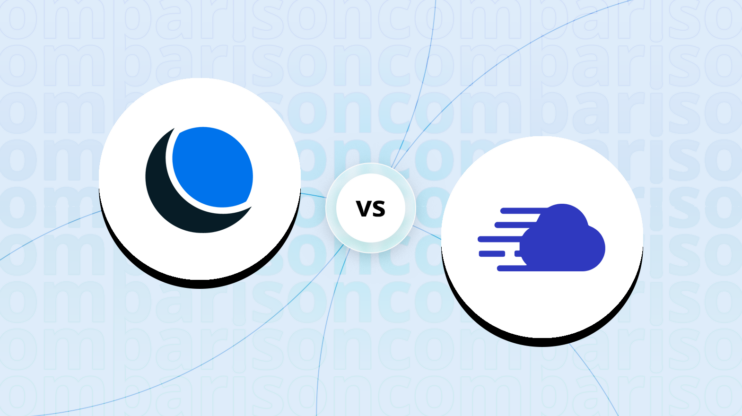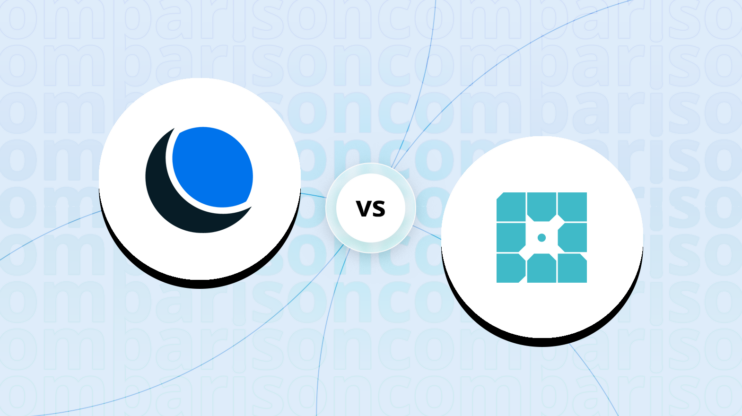Digital Ocean vs Web Hosting Hub: Final verdict
Looking over DigitalOcean vs. Web Hosting Hub, both offer various hosting solutions catering to different users but differ significantly in features, performance, and overall value.
-
DigitalOcean (Overall grade: 8.3)
provides robust uptime and extensive geographical reach with 14 global data centers. It excels in performance through features like SSD storage, multiple caching mechanisms, and a built-in Content Delivery Network (CDN). Its platform supports scalability and high uptime with advanced security measures including DDoS protection, firewalls, and two-factor authentication. Additionally, DigitalOcean is favored by developers for its customizable environments, though it doesn’t offer dedicated email hosting. While it’s an excellent choice for high-traffic and tech-savvy users, it might not be the best for those needing an easy, beginner-friendly experience.
Web Hosting Hub (Overall grade: 7.5)
is more user-friendly and includes features like free domain registration, free and unlimited email hosting, and a website builder which is ideal for small businesses and personal websites. It provides cost-effective plans with unlimited storage, bandwidth, and websites, though its performance features, such as SSD speeds and standard caching, fall short compared to DigitalOcean’s comprehensive caching options. The inclusion of drag-and-drop site building tools and integrated management makes it accessible, and the 90-day money-back guarantee highlights their confidence in customer satisfaction. However, for more advanced or rapidly scaling needs, it lacks the elastic scaling and detailed user roles that DigitalOcean offers.
 Overall grade:8.3 |
 Overall grade:7.5 |
|
|---|---|---|
| Uptime and Availability | 9.2 | 9.2 |
| Hosting Performance | 8.8 | 5.0 |
| Hosting Security | 9.1 | 8.0 |
| Price | 8.7 | 7.6 |
| Hosting Features | 6.9 | 6.9 |
| Ease Of Setup | 8.2 | 8.8 |
| User Management | 8.0 | 7.1 |
| Customer Support | 7.8 | 7.8 |
| User feedback | 4.6/5 | 4.5/5 |
Hosting types offered
Both platforms provide a variety of hosting types, each designed to meet the different needs of users.
 |
 |
|
|---|---|---|
| Shared hosting | ||
| Cloud hosting | ||
| WordPress hosting | ||
| Ecommerce hosting | ||
| VPS hosting | ||
| Dedicated hosting |
Both offer a variety of hosting plans tailored to different needs, in certain cases, one platform may prove to be more suitable.
Detailed comparison
Uptime and availability
Evaluates the average uptime statistics, uptime guarantee and overall availability of the hosting
provider
Score Components:
- Uptime percentage (30%): evaluates the uptime statistics in given period of time
- Uptime guarantee (20%): Assesses if the platform offers an uptime guarantee and
whether the actual uptime matches the promised guarantee. - General performance (25%): Evaluates how fast is the average response time and overall
it’s stability. - Responsiveness (10%): Adaptability to different devices and screen sizes.
- Availability (25%): Reflects the total downtime and number of outages.
 9.2
9.2
 9.2
9.2
🏆 Winner DigitalOcean: Offers exceptional real-time monitoring and a strong 99.99% uptime SLA.

DigitalOcean provides a comprehensive suite of uptime and availability features that cater to both large-scale and small-scale operations. Their 99.99% uptime guarantee, combined with real-time alerts and global monitoring, ensures that online services are consistently available. The platform supports high performance with automated backups, load balancers, and multiple data centers, which contribute to its reliable and secure infrastructure.

Web Hosting Hub offers competitive pricing and includes SSD speed enhancements and a free SSL as part of their service. With unlimited bandwidth and a 90-day money-back guarantee, it’s a cost-effective option for individuals and small businesses. Their performance plans—Spark, Nitro, and Dynamo—cater to varying needs with up to 4X performance improvements.
Which one has better hosting performance?
Score Components:
- Hosting speed (30%): This includes SSD quality, Load times, PageSpeed score ranges,
additional information on website speed, built-in plugins for performance enhancement, available caching
methods, and CPU/RAM options - CDN (20%): Considers whether CDN is available or not, whether it’s free or paid, and
the quality of the CDN service - Available data centers (30%): Evaluates the number of data centers and their locations
globally. - Scalibility (20%): Looks at whether elastic scaling is available, the process required
to scale (manual upgrade vs. automatic scaling), the presence of dedicated servers, and the costs
associated with scaling.
 8.8
8.8
 5.0
5.0
🏆 Winner DigitalOcean: Advanced features and high versatility.
DigitalOcean stands out primarily due to its impressive performance metrics and extensive geographical reach. It utilizes SSD storage and offers a fully managed Platform as a Service (PaaS), known as the App Platform, that simplifies the management of static websites and applications. DigitalOcean supports various caching mechanisms to enhance website speed and includes a built-in Content Delivery Network (CDN) for improved responsiveness and reduced server load. With 14 globally distributed data centers, it guarantees excellent uptime and reliability. Web Hosting Hub also provides decent basic plans with unlimited resources, but it lacks the advanced caching methods and extensive data center network that DigitalOcean offers.
Website Speed
DigitalOcean’s website speed benefits significantly from its use of SSD storage and various caching mechanisms, which include page and object caching. Its CDN optimizes content delivery, reducing load times by distributing content closer to the user’s location. Web Hosting Hub does offer SSD storage, which is 20 times faster than traditional hard drives, and has different performance levels across its plans such as standard and 4X speeds. However, it doesn’t offer the comprehensive caching options or an integrated CDN, making DigitalOcean the superior choice for website speed.
Scalability
DigitalOcean excels in scalability with its elastic scaling options, allowing users to dynamically adjust resources based on traffic demands without manual intervention. Users can easily configure load balancing and horizontal scaling to handle high traffic periods. Pricing starts at an affordable $4 per month, and scaling resources is both straightforward and cost-effective. On the other hand, Web Hosting Hub requires users to upgrade their plans to the next tier for additional resources, and it does not mention elastic scaling. The process is less fluid and may incur higher costs as your website grows.
Which one has better security features?
and regulatory requirements
Score Components:
- Technical security measures (40%): This includes encryption, firewalls, DDoS
protection, secure configurations, server monitoring, access control and availability of security addons
(e.g Sitelock security). - Operational security measures (30%): Encompasses data privacy, backups and data
redundancy. - Compliance and certifications (20%): Adherence to legal and regulatory requirements
(e.g., GDPR, HIPAA) and possession of certifications (e.g., ISO 27001, SOC 2). - Business and reliability (10%): Factors in the provider’s reputation, uptime
guarantees, and customer support.
 9.1
9.1
 8.0
8.0
🏆 Winner
DigitalOcean: Robust security features gain a competitive edge in hosting solutions.
Technical security measures:
DigitalOcean supports various PHP versions and offers comprehensive DDoS protection, firewalls, SSH access, and two-factor authentication (2FA). It also provides automated backups and data encryption both in transit and at rest. Web Hosting Hub, on the other hand, offers PHP 7, advanced policy firewall protection, suPHP encryption, and several additional security measures such as hotlink protection, custom error pages, and IP blocking. Both providers offer SSL certificates and SSH access, ensuring secure connections and remote server management.
Operational security measures:
DigitalOcean’s operational security measures include load balancers, managed databases with TLS/SSL connections, and S3-compatible object storage with identity verification and data encryption. Web Hosting Hub provides 24/7/365 U.S.-based support, automatic backups with a backup tool, and options for data centers on the east and west coasts of the U.S. Both platforms emphasize the importance of data backups and provide intuitive tools for managing server security.
Compliance and certifications:
DigitalOcean shines with several compliance certifications, including GDPR and PCI-DSS compliance, SOC 2 Type II, SOC 3 Type II, ISO/IEC 27001:2013, CSA STAR Level 1, and APEC CBPR PRP. Web Hosting Hub does not explicitly mention GDPR or PCI compliance but does focus on data security and privacy.
 |
 |
|
|---|---|---|
| SSL certificate | Yes | Yes |
| Additional security features | Firewalls, DDoS, Backups, 2FA | Advanced Policy Firewall, suPHP, etc. |
| PHP versions | Various versions | PHP 7 |
| GDPR compliance | Yes | Not specified |
| HIPAA compliance | Not specified | Not specified |
| PCI compliance | Yes | Not specified |
Hosting features
Score Components:
- Domains (20%): Assesses the availability of a free domain, domain purchase options, and
pricing - Email (15%): Considers if the provider offers full email hosting, or is reselling
third-party service, and if the email is only transactional or not - Website builder (15%): Checks if website builder is available, and it’s user
friendliness and overall the level of customization allowed. - Staging environment (20%): Determines if a staging environment is available, allowing
for testing changes before going live. - FTP & SFTP accounts (10%): Evaluates if and how easily users can access FTP and
SFTP accounts - Git and SSH access (20%): Assess whether Git is integrated into the hosting service and
if SSH access is provided
 6.9
6.9
 6.9
6.9
Winner: DigitalOcean: With advanced security and performance features, DigitalOcean stands out for tech-savvy users and enterprises.
DigitalOcean and Web Hosting Hub both provide a comprehensive suite of hosting features catering to varied user needs. DigitalOcean emphasizes advanced security measures like DDoS protection, firewalls, and two-factor authentication, which are essential for businesses needing robust security. Additionally, DigitalOcean offers a range of hosting options, including VPS and managed Kubernetes, making it suitable for developers and tech enthusiasts who require scalable solutions. The inclusion of a 99.99% uptime SLA ensures reliable service performance, and high-speed networking bolsters their appeal to performance-driven users. Although they don’t highlight a free domain, the extensive security features and infrastructure services such as Virtual Private Cloud and CDN are marked benefits.
Web Hosting Hub, on the other hand, provides a user-friendly experience with free domain registration and transfers, making it an attractive choice for small businesses and personal websites. Their plans include unlimited websites, databases, storage, and bandwidth, especially useful for growing businesses. The free SSD and SSL add to the value, ensuring faster website performance and secure connections. The availability of a free drag-and-drop website builder, BoldGrid, simplifies website creation for non-technical users. Unique selling points like $150 in ad credits and complimentary website transfers further enhance its appeal for beginners. Both providers support SSH, with Web Hosting Hub also offering cPanel for integrated management, catering to diverse user needs.
 |
 |
|
|---|---|---|
Free Domain |
No |
Yes |
Free SSL |
Yes |
Yes |
Email Hosting |
No |
Yes |
Website Builder |
No |
Yes |
Staging Environment |
Yes |
Yes (WordPress) |
FTP & SFTP Accounts |
SFTP via SSH |
Yes |
Git and SSH Access |
Yes |
Yes |
Free Backup |
Yes |
Add-on ($1/month) |
Money-Back Guarantee |
No |
Yes (90 days) |
Both providers support a range of users from beginners to experts with user-friendly website builders and WordPress staging areas. However, in terms of developer tools, both DigitalOcean and Web Hosting Hub offer robust options including SSH access, support for multiple programming languages, and Git for version control, thus appealing to developers looking for advanced capabilities.
Email Services:
Web Hosting Hub offers a comprehensive email hosting service with unlimited email accounts on all plans, suitable for both personal and business use. Users can set up and manage their emails via a user-friendly interface and benefit from features like spam protection. In contrast, DigitalOcean does not provide dedicated email hosting services. Users would need to configure their own email servers or integrate third-party email services such as Google Workspace. This makes Web Hosting Hub a better fit for users who need straightforward email management and campaign capabilities directly from their hosting service.
Price
Score Components:
- Plan value (40%): What each pricing tier offers.
- Transparency and clarity (30%): Clearness of pricing structures.
- Flexibility of plans (20%): Range of options to suit different budgets.
- Hidden costs (10%): Additional expenses not included in the plan.
 8.7
8.7
 7.6
7.6
🏆 Winner DigitalOcean:Offering an array of flexible hosting plans with competitive pricing and advanced features.
Evaluating the pricing of plans among various hosting providers can be complex due to their differing pricing and renewal strategies. Additionally, certain plans require annual commitments, which adds to the difficulty of making comparisons. The prices listed are based on monthly commitments; plans requiring annual commitments are indicated. Additionally, although some providers offer identical plans for WordPress and shared hosting, we have created separate tables for each to enhance clarity.
Comparing the pricing plans of DigitalOcean and Web Hosting Hub reveals notable differences in value and offerings. DigitalOcean’s WordPress hosting starts as low as $4 per month and includes essential features like free SSL certificates and automatic backups. Web Hosting Hub’s Dynamo Plan, while more expensive starting at $9.99 monthly, includes unlimited websites and storage, but backups are an additional cost. For shared hosting, Web Hosting Hub offers considerable storage and email features starting at $5.99 per month, while DigitalOcean provides basic droplets with scalable resources and transparency starting at $4 per month. DigitalOcean’s cloud hosting focuses on multiple performance tiers, whereas Web Hosting Hub’s plans provide generous storage and resources aimed at small businesses and dynamic sites.
 |
 |
|---|---|
|
WordPress Hosting Basic Droplet$4
1 website, automatic backups, DDoS protection, free SSL, 4TB transfer, 24/7 support, $100 in free hosting credits Value for price:8.7
|
Spark Plan$11.99
2 websites, standard performance, unlimited storage and bandwidth, free SSL, $150 advertising credits, 24/7 support Value for price:7.6
|
|
Cloudways Managed WordPress Hosting$100 in free credits
managed infrastructure, no plugin restrictions, unlimited visitors, built-in DDoS protection, 24/7 support Value for price:8.7
|
Nitro Plan$15.49
unlimited websites, 2x performance, unlimited storage and bandwidth, free SSL, $150 advertising credits, backups $1/month, 24/7 support Value for price:7.6
|
|
N/A
|
Dynamo Plan$20.49
unlimited websites, 4x performance, unlimited storage and bandwidth, free SSL, $150 advertising credits, backups $1/month, 24/7 support Value for price:7.6
|
 |
 |
|---|---|
|
Secure Web Hostingnot explicitly mentioned
VPS hosting, DDoS protection, automatic backups Value for price:8.7
|
Spark Plan$11.99
2 websites, standard performance, unlimited storage and bandwidth, free SSL, $150 advertising credits, 24/7 support Value for price:7.6
|
|
Website Hosting Basic Droplet$4
1-click apps, transparent pricing, 14 data centers, 99.99% uptime SLA, simple and reliable Value for price:8.7
|
Nitro Plan$15.49
unlimited websites, 2x performance, unlimited storage and bandwidth, free SSL, $150 advertising credits, backups $1/month, 24/7 support Value for price:7.6
|
|
N/A
|
Dynamo Plan$20.49
unlimited websites, 4x performance, unlimited storage and bandwidth, free SSL, $150 advertising credits, backups $1/month, 24/7 support Value for price:7.6
|
 |
 |
|---|---|
|
VPS Hosting Regular Shared CPU Droplets$4
shared processing power, scalable infrastructure, 4TB transfer, 24/7 support Value for price:8.7
|
Spark Plan$11.99
2 websites, standard performance, unlimited storage and bandwidth, free SSL, $150 advertising credits, 24/7 support Value for price:7.6
|
|
VPS Hosting Premium Shared CPU Droplets$7
enhanced memory performance, NVMe SSDs, 4TB transfer, 24/7 support Value for price:8.7
|
Nitro Plan$15.49
unlimited websites, 2x performance, unlimited storage and bandwidth, free SSL, $150 advertising credits, backups $1/month Value for price:7.6
|
|
VPS Hosting Dedicated CPU Droplets$42
4GB memory, 25GB SSD, 4TB transfer, dedicated processing power Value for price:8.7
|
Dynamo Plan$20.49
unlimited websites, 4x performance, unlimited storage and bandwidth, free SSL, $150 advertising credits, backups $1/month Value for price:7.6
|
Enterprise plans
For enterprise-level needs, DigitalOcean provides a range of VPS hosting options, including dedicated and memory-optimized droplets, starting at $42 per month. These plans offer enhanced performance with dedicated CPU power and higher memory capacity, catering to high-demand applications. On the other hand, Web Hosting Hub’s Dynamo Plan, starting at $20.49 per month, targets smaller enterprises with unlimited websites and storage, though it lacks the customizable infrastructure options available with DigitalOcean.
Digital Ocean vs Web Hosting Hub: Ease of setup
platform.
Score Components:
- Site migration (25%): Assesses whether the provider offers tools for site migration,
either automated or manual, and whether these services are free or require a fee. - Admin panel usability (35%): Evaluates the type of admin panel provided, such as the
standard cPanel or a custom solution, focusing on its accessibility and user-friendliness for both
technical and non-technical users. - Setup features (20%): Examines the availability and ease of use of various setup
features, including FTP accounts, file managers, email account setup, PHPMyAdmin, and easy CDN
configuration. - Help center quality (20%): Measures the quality and accessibility of the provider’s
help center resources, including articles and tutorials.
 8.2
8.2
 8.8
8.8
🏆 Winner: Web Hosting Hub: A user-friendly option with excellent setup ease and extensive support.
DigitalOcean uses a combination of Droplets, 1-Click Apps, and a custom App Platform for its admin panel. This flexibility makes it attractive to both technical users who appreciate the granularity of control and non-technical users who prefer preconfigured environments. DigitalOcean’s approach allows users to scale resources as needed, providing a balance between ease of use and advanced capabilities.
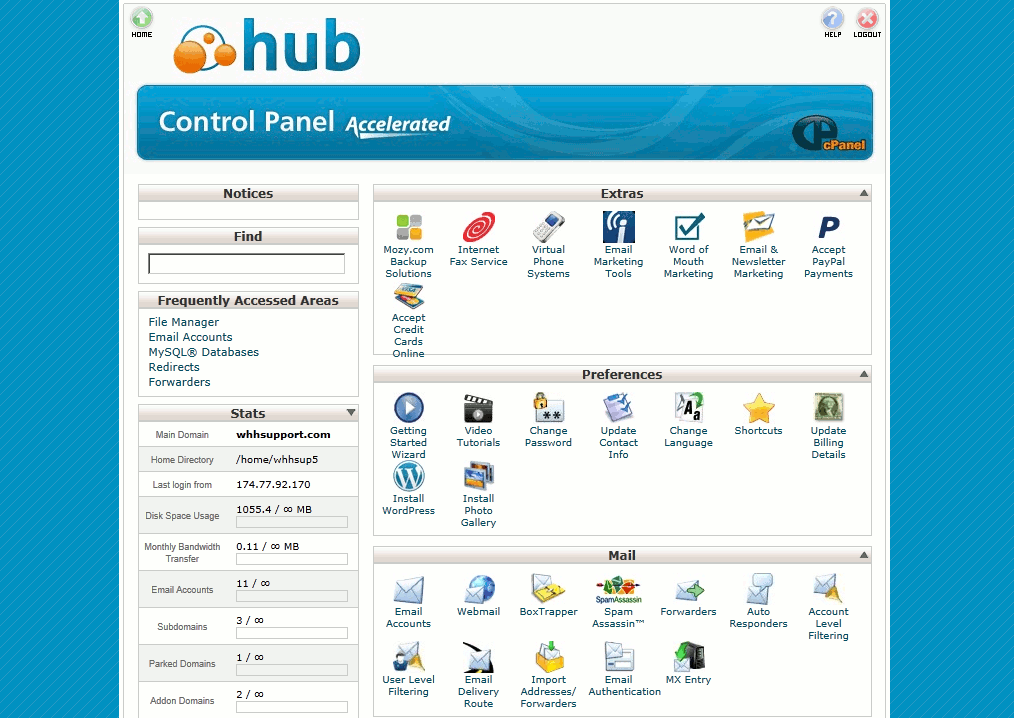
Web Hosting Hub offers a more traditional cPanel, combined with Softaculous for 1-Click Installs and BoldGrid for website building. This setup is highly accessible for non-technical users, featuring a drag-and-drop interface and pre-installed applications, making website management straightforward. The inclusion of auto-installed tools during checkout further simplifies the user experience, catering to those who may not have a technical background but still want to efficiently manage a website.
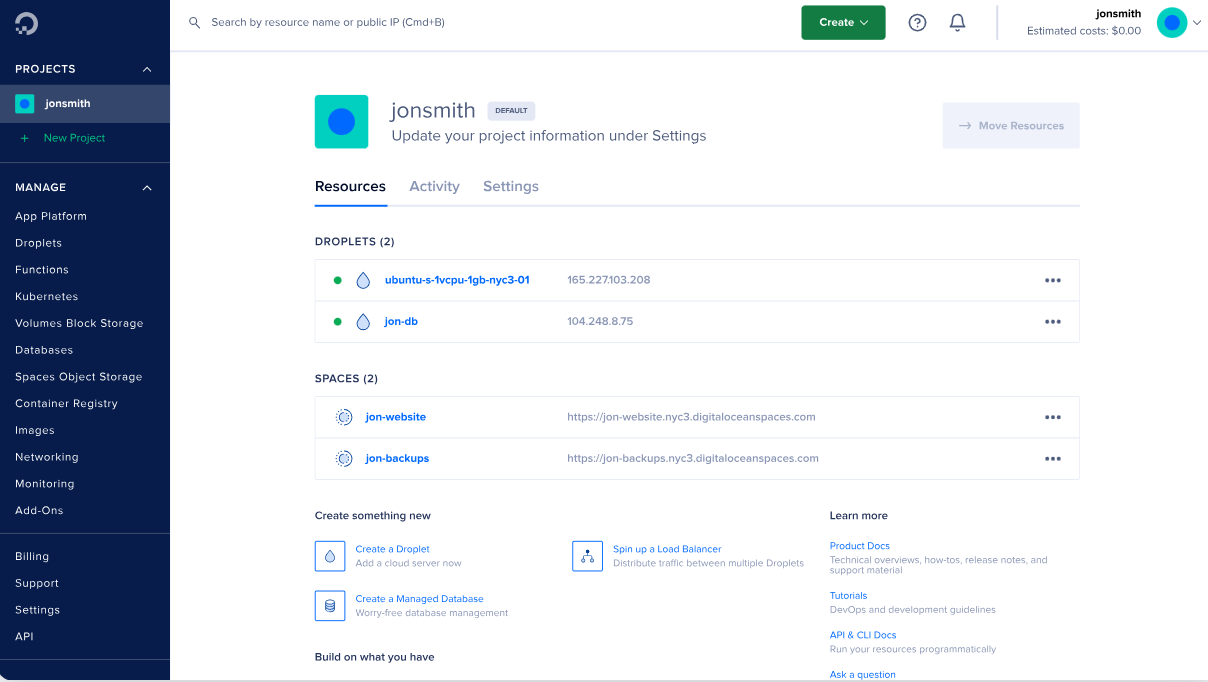
Both providers offer migration tools but differ in their approaches. DigitalOcean relies on its extensive documentation and community support to guide users through manual migration processes. While this may require a bit more technical know-how, it offers flexibility. Web Hosting Hub, on the other hand, provides more automated migration options, often free of charge, which streamlines the process for users who need to transfer their websites without hassle.
DigitalOcean’s help center is full of extensive documentation, tutorials, and community forums where users can find answers to a wide range of technical questions. Its free customer support system ensures users get timely help. Web Hosting Hub’s help center includes an extensive knowledge base, community Q&A, and learning resources, with continuous support available via email, phone, and chat.
User management
accessibility.
Score Components:
- Role customization (40%): Flexibility in creating and defining user roles and
permissions. - Ease of management (30%): User interface and tools for managing users.
- Access control (20%): Effectiveness of access control measures for different user
levels. - Scalability (10%): Ability to manage a growing number of users efficiently.
 8.0
8.0
 7.1
7.1
🏆 Winner
DigitalOcean: Offers superior user management and team collaboration features.
DigitalOcean provides a more structured and detailed approach to user roles and permissions compared to Web Hosting Hub. With DigitalOcean, team owners have extensive control, including the ability to invite, revoke, and change team member roles, which include Owner, Biller, and Member. Each role has clear, distinct access levels, making it easy to manage large teams. Web Hosting Hub, on the other hand, focuses more on managing technical aspects such as email, FTP, and database management through cPanel, but lacks explicitly defined user roles or a clear structure for team collaboration.
In terms of user interfaces and tools for managing users, DigitalOcean stands out with a dedicated “Invite Members” button and a comprehensive membership table that provides visibility into roles and sign-in methods for added security. The platform’s interface is designed to be straightforward, allowing quick access to essential management functions. Web Hosting Hub relies on cPanel for user management, which may not offer the same level of intuitive team management but provides solid tools for technical administration tasks.
DigitalOcean showcases strong access control measures with team owners being able to oversee all user roles and their security settings, such as two-factor authentication methods. This level of control supports scalability, allowing teams to grow without compromising on security or control. Web Hosting Hub’s approach is more traditional, offering security measures like password-protected directories and IP blocking, which are effective but may require more manual effort to manage a growing user base.
DigitalOcean User Roles Table:
| Role | Description | Access highlights |
|---|---|---|
| Owner | Full control of team settings and resources | Full access to resources, billing, and team settings |
| Biller | Manages billing information | Access to billing information only |
| Member | Works with shared resources | Access to shared resources; no access to billing or settings |
Customer support
hosting provider.
Score Components:
- Support communication channels (30%): Measures the variety of customer support types
provided (live chat, chatbot, email, phone, etc.) - Availability (20%): Assesses the availability hours for each channel, including 24/7
support options. - Technical support quality (30%): Assesses whether the provider offers comprehensive
technical support, including hardware upgrades (e.g., HDD to SSD), software installations, and web
server configuration changes. - Enterprise support (20%): Checks if there are dedicated or priority support services
for enterprise-level customers.
 7.8
7.8
 7.8
7.8
🏆 Winner
Web Hosting Hub: Offers a superior money-back guarantee and comprehensive phone support for various departments.
 |
 |
|
|---|---|---|
Phone support |
||
Live chat support |
Yes (premium) |
|
Chatbot |
||
Email/ticket support |
||
Enterprise support (dedicated agent, priority support) |
Yes (SLA) |
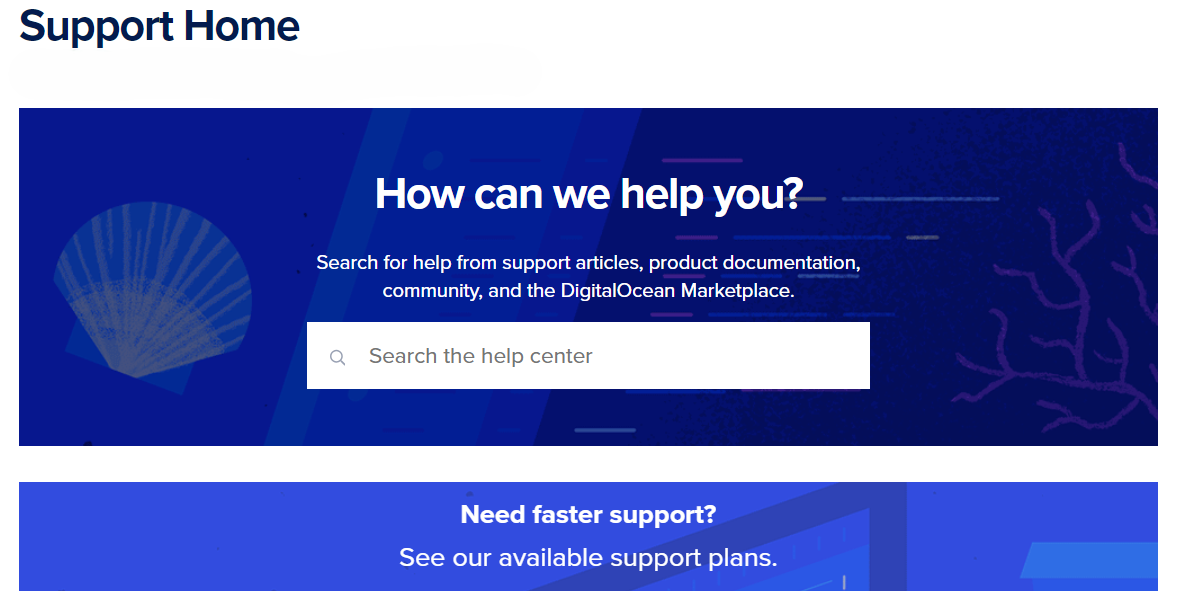
Both DigitalOcean and Web Hosting Hub offer extensive customer support options, but there are key differences. DigitalOcean provides 24/7 online ticketing with an SLA, email support for non-urgent issues, premium live chat, and a comprehensive knowledge base, including tutorials and documentation. Their community forums allow users to find answers to common problems. Conversely, Web Hosting Hub offers 24/7 phone support for various departments, such as general support, sales, and billing, among other contact methods like email and chat support.

Web Hosting Hub stands out with their 90-day full money-back guarantee, illustrating their commitment to customer satisfaction. They also ensure accessibility with features like screen reader support. While DigitalOcean focuses on pay-as-you-go pricing and technical tutorials, Web Hosting Hub excels in direct, round-the-clock phone support and offers flexible accessibility options, catering to a broad audience.
Digital Ocean vs Web Hosting Hub: User feedback
User reviews for this hosting provider highlight its ease of use, affordability, and robust customer support. Users appreciate the simple and intuitive user interface, which simplifies the setup and management of virtual servers (droplets) and other cloud infrastructure. Many commend the company for its transparent pricing model and lack of hidden costs. However, some users mention limitations in higher-scale configurations and occasional slow customer support response times. Overall, it is highly recommended for small to medium-sized businesses and developers due to its reliable performance and reasonable pricing.
Overall, users appreciate the ease of use, affordability, and extensive features offered by this hosting provider. Many reviews praise the customer support for being responsive and knowledgeable, contributing to a generally positive experience. However, some users have noted the interface can be complex and occasionally overwhelming, and there are mixed feelings about the pricing for additional services like SSL. Despite minor inconveniences such as periodic connectivity issues and maintenance times, the hosting provider is highly recommended for its value and efficient support.
Digital Ocean vs Web Hosting Hub: FAQ
Which platform is better suited for hosting WordPress websites?
Both DigitalOcean and Web Hosting Hub offer specialized WordPress hosting solutions. DigitalOcean features scalable resources with high adaptability, making it an excellent choice for websites expecting growth and high traffic. Web Hosting Hub provides more user-friendly options with a focus on smaller websites and includes tools like a website builder. The choice depends on the level of flexibility and technical needs of the user.
Which hosting service offers better security features?
DigitalOcean provides advanced security features including DDoS protection, firewalls, two-factor authentication, and automated backups, ensuring robust protection for hosted environments. Web Hosting Hub offers standard security measures like suPHP encryption, policy firewalls, and hotlink protection but lacks some of the advanced options provided by DigitalOcean. Overall, DigitalOcean stands out for its comprehensive security offerings.
What are the major differences in pricing and value between digitalocean and webhostinghub?
DigitalOcean offers competitive pricing starting at $4 per month for its basic droplet plans, focusing on transparent and scalable resource management suited for developers. Web Hosting Hub’s plans start at $5.99 per month and include unlimited websites, storage, and email hosting, making it cost-effective for small businesses. While DigitalOcean emphasizes performance and infrastructure scalability, Web Hosting Hub provides extensive features at a lower entry cost.
Which hosting service offers more scalability options for growing websites?
DigitalOcean excels in scalability with elastic scaling options, allowing dynamic adjustment of resources based on traffic demands and automated load balancing. This flexibility makes it suitable for websites expecting rapid growth. Web Hosting Hub requires plan upgrades for additional resources and may not support the same level of dynamic scaling, making DigitalOcean the superior choice for growing websites.
Which platform offers better customer support?
Web Hosting Hub offers 24/7 phone support, live chat, and a comprehensive knowledge base, making it highly accessible for immediate assistance. DigitalOcean provides extensive documentation, tutorials, community forums, and email support, but lacks direct phone support. For users seeking hands-on, direct assistance, Web Hosting Hub generally offers better customer support.
The making of this blog
We followed a clear, step-by-step process to write and research this article.









